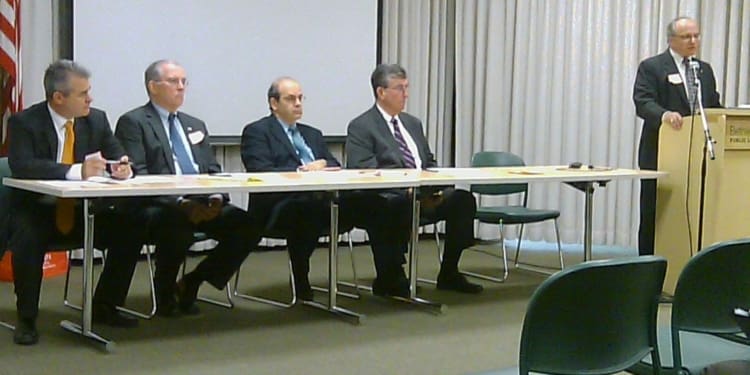The prospects of a longer life and a tight economy are leaving many seniors with few financial options. That’s the crux of the many subjects discussed during a Seniors Summit held Oct. 25 at the Bethlehem Public Library. The forum included perspectives from Michael Burgess, the former director of the New York State Office for the Aging, who described a situation of “promise and peril” for seniors. He explained how budget cuts in recent years on the state level have led to cuts in programs such as home-delivered meals and community services for the elderly. “We should spend more to keep these people in their homes, rather than putting them on the Medicaid rolls,” said Burgess. The problems were clear and familiar to many in the audience, who heard perspectives on what’s being done at the local, state and federal level. “It may not be discussed by the public, but people who work with seniors all the time are very much aware that we do not have enough money to help people who are trying to age safely at home,” said Lois Wilson, a resident of Bethlehem who has experience working with committees on issues pertaining to seniors throughout the Capital District. One main theme at the summit was a conversation about the differences between nursing homes and the concept of seniors staying in their homes and aging in place. Albany County Executive Michael Breslin was in attendance, and told the audience that it is less expensive to keep people where they are, but went on to say that there is “no question that there is a dramatic lack of resources.” Breslin’s proposed county budget for 2012 calls for a 19.2 percent tax levy increase. Wilson said there is a connection between those rising taxes, and a failure to provide for seniors who want to stay in their homes. “In this town, we really need more subsidized housing,” said Wilson, “and more support for seniors who are trying to age in place.” During a question and answer session at the end of the summit, the issue of transportation was raised. Audience members made points about the impact on seniors when public transportation routes are reduced and altered. Burgess said transportation issues are always in the top three when a list of concerns for seniors is compiled. Bethlehem Supervisor Sam Messina highlighted the successful programs for seniors in the town, and said that older residents need to stay in place for their continued contribution to the community. “Our seniors are some of our most engaged people in the community, and I like the point that was raised about in some societies, there is a long-standing tradition of respect and appreciation for our seniors,” said Messina. “I think in some areas of our country that doesn’t exist anymore.” That support for seniors may not be at the top of a list of priorities in the near future, when a bipartisan committee of federal lawmakers attempts to tackle the nation’s budget deficit. Burgess told the audience that while big-ticket items like Social Security may be off the table, cuts may be on the way in a number of areas. He cited the Older Americans Act, which was passed in 1965 in response to concerns that there weren’t enough community social services for the elderly. Burgess said he’s worried that deep cuts will impact state and local offices that handle issues pertaining to seniors. “We are in a situation where we are in danger of not seeing the progress we’ve made continue,” said Burgess. Burgess said many of the items related to funding cuts would be making news as the Washington committee reaches decisions in November.
Resources scarce for seniors
Leave Comment



